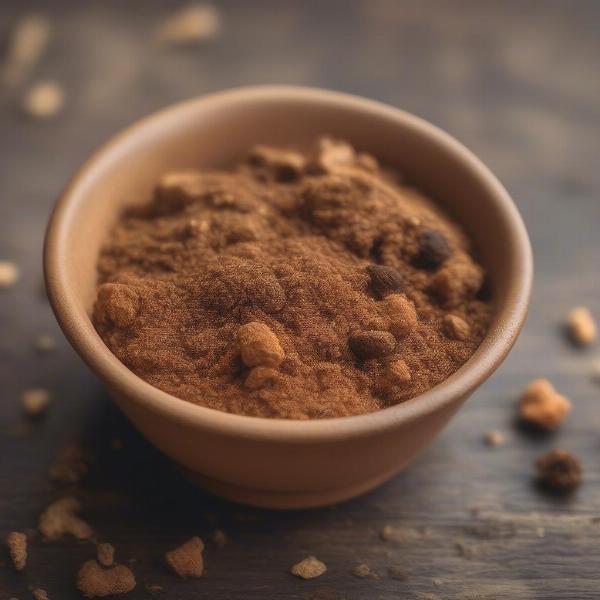Chaga mushroom (Inonotus obliquus), a fungus that grows primarily on birch trees, has gained popularity as a potential health supplement for both humans and dogs. While anecdotal evidence suggests various benefits, it’s essential to understand the current scientific knowledge, potential risks, and best practices before giving chaga mushroom to your canine companion. This article will provide a comprehensive overview of chaga mushroom for dogs, covering its purported benefits, potential side effects, recommended dosage, and how to use it safely.
Understanding Chaga Mushroom and its Potential Benefits for Dogs
Chaga is touted for its high antioxidant content, particularly betulinic acid, which is believed to have anti-inflammatory and immune-boosting properties. While research on chaga’s effects on dogs is limited, some proponents suggest that it may offer several potential benefits, including:
- Immune System Support: The antioxidants in chaga are thought to strengthen the immune system, potentially helping dogs fight off infections and diseases.
- Reduced Inflammation: Chaga’s anti-inflammatory properties may help manage conditions like arthritis and allergies in dogs.
- Improved Digestive Health: Some believe chaga can aid digestion and promote gut health in dogs.
- Allergy Relief: Anecdotally, chaga has been used to manage allergy symptoms in dogs.
- Increased Energy Levels: Some dog owners report increased energy and vitality in their dogs after using chaga.
Potential Risks and Side Effects of Chaga Mushroom for Dogs
While generally considered safe, chaga mushroom can potentially interact with certain medications, especially those affecting blood clotting. It’s crucial to consult with your veterinarian before giving chaga to your dog, especially if they have any underlying health conditions or are taking other medications. Potential side effects, although rare, can include:
- Digestive upset: Some dogs may experience diarrhea or vomiting.
- Hypoglycemia: Chaga can lower blood sugar, which can be dangerous for dogs with diabetes or other blood sugar regulation issues.
- Bleeding disorders: Chaga may increase bleeding risk, particularly in dogs with pre-existing bleeding disorders or those taking blood-thinning medications.
How to Use Chaga Mushroom for Dogs and Recommended Dosage
Chaga mushroom for dogs is typically available in powdered, tincture, or extract form. Always choose a product specifically formulated for pets from a reputable supplier. There is no established dosage guideline for dogs, so it’s crucial to start with a very small amount and gradually increase it as needed, always monitoring your dog for any adverse reactions. Consult with your veterinarian for guidance on appropriate dosage based on your dog’s size, age, and health condition.
Is Chaga Mushroom Right for Your Dog?
Deciding whether to give your dog chaga mushroom should be a decision made in consultation with your veterinarian. While anecdotal evidence suggests potential benefits, more research is needed to confirm its efficacy and safety in dogs. Discuss your dog’s health history, current medications, and potential risks and benefits with your vet to determine if chaga is a suitable supplement for your furry friend.
 Dog eating chaga mushroom powder mixed with food
Dog eating chaga mushroom powder mixed with food
Conclusion: Proceed with Caution and Veterinary Guidance
Chaga mushroom holds promise as a potential health supplement for dogs, but its benefits and long-term effects are still under investigation. Always prioritize your dog’s safety by consulting with your veterinarian before incorporating chaga into their diet. Start with a small dose, monitor for side effects, and choose products from reputable sources to ensure the best possible outcome for your canine companion.
FAQ:
- What are the potential benefits of chaga for dogs? Potential benefits include immune support, reduced inflammation, improved digestion, and allergy relief. However, research is ongoing.
- Can chaga be harmful to dogs? While generally considered safe, chaga can potentially interact with certain medications and cause side effects like digestive upset or hypoglycemia.
- How much chaga should I give my dog? There’s no established dosage. Consult your vet for guidance based on your dog’s individual needs.
- Where can I buy chaga for my dog? Choose products specifically formulated for pets from reputable suppliers.
- What form of chaga is best for dogs? Chaga for dogs is typically available in powder, tincture, or extract form.
- Are there any dog breeds that should avoid chaga? Dogs with bleeding disorders or those taking blood-thinning medications should generally avoid chaga. Always consult with your veterinarian.
- Should I tell my vet if I’m giving my dog chaga? Absolutely. Open communication with your vet is crucial for your dog’s safety and well-being.
ILM Dog is a leading online resource dedicated to providing dog owners worldwide with expert advice and information on all aspects of canine care. From breed selection and health to training, nutrition, and grooming, we offer practical, reliable content to help you provide the best possible care for your furry friend. For more expert advice on dog health and nutrition, explore our extensive library of articles and resources. Contact us at [email protected] or call us at +44 20-3965-8624. ILM Dog is your trusted partner in responsible dog ownership.